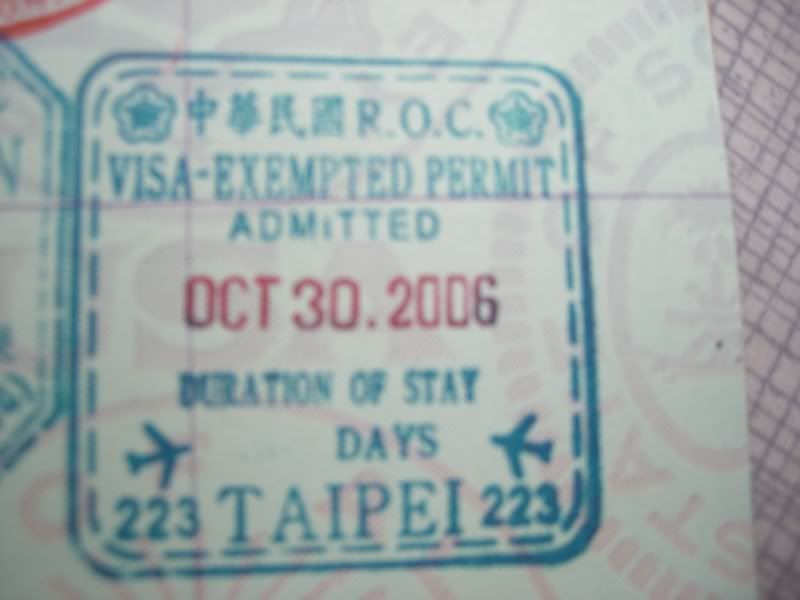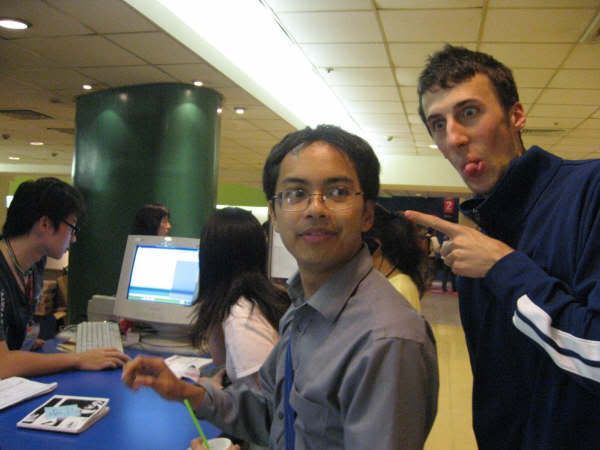
The dreaded "visa-exempt entry" stamp in my passport. Read on for details.
From the moment I first stepped into Taipei back in April 2006, I felt at home. It was hard to go back to Shanghai.
Now, I was in Taiwan to stay. But that wouldn't be easy, due to the country's onerous visa laws. I had tried to apply for a Taiwan visitor visa in Singapore before my arrival in Taiwan. A visitor visa lasts 60 days and can be converted into a one-year resident visa. If you get a visitor visa that allows extensions, you can extend it twice, making it last 6 months in total.
Unfortunately, the Taiwan embassy in Singapore rejected my visa request. They wanted a ridiculous amount of documentation and even said I had to have a letter of invitation from a Taiwanese citizen! If I always had to have a friend in a country before I could visit it, I'd never be able to travel anywhere!
So instead, I came into Taiwan on the dreaded "visa-exempt entry" that you get on arrival at the airport. It meant I only had 30 days to find a job and I had to leave the country at the end of that period. No extensions, no conversions, no nothing because there was no visa to extend or convert, just a stamp in my passport. Basically, the message was to get the hell out after 30 days.
I almost felt like giving up, before I even got started. There was no way I could find a job in 30 days! I've faced some challenges as a traveler before, but I wasn't a miracle worker.
Nevertheless, I threw myself into it. I actually made a list of the things I should have done when I first arrived in China. That way, I wouldn't repeat my mistakes in Taiwan. Some examples:
--Stay in a hostel for the first few weeks and talk to other backpackers. This is by the far the best thing a newly arrived English teacher can do. In a short time, you can get up to speed on what the job market is like, employers to call and to avoid, how to do visa runs, etc. The knowledge gained is invaluable. I stayed at World Scholar House and highly recommend it.
--Get a local phone number. Either get a new mobile phone or a SIM card as soon as you arrive in the country. Employers, friends, and other people all need a way to contact you.
--Research the visa situation before arriving in the country. Sometimes, it's easier to apply for a visa in your home country instead of abroad.
--Get a medical examination at a local hospital to get a health clearance certificate. This is often required to get a work permit. In Taipei, my hospital took a week to process a health clearance, so I had to act fast.
--Find the local expat website. Most countries with a significant expat population will have at least one website where expats can find jobs, apartments, etc. You'll be checking it a lot when you first arrive. Here are a few in Asia:
Taiwan: Tealit
Japan: Gaijin Pot
China: Asia Expat (especially Shanghai)
Korea: ESL Cafe
Now on to the job search. Since I had experience in Shanghai, it was relatively easy to secure interviews. The maddening part was that Taiwanese English school directors could be just as racist as their counterparts in China. The difference was that Chinese bosses were more direct, saying, "You can't be American, you look Chinese." Taiwanese bosses generally spoke better English and were more subtle, asking, "So, where are your parents from?"
I also had some liabilities that were instant dealbreakers: I wanted to be in Taipei City, I wanted to teach adults, and worst of all, I was Asian-American. If I could have given up one of the first two (the third was impossible), I would have had more of a chance to get a job. But I didn't want to make too many concessions, otherwise my time in Taiwan would be miserable. Also, Taiwan had been opened up to the West for longer than China, so many adult professionals could already speak English, driving down demand for teachers.
I was facing racism, a decline in the adult-teaching market and competition from other English teachers who wanted to live in Taipei. The battle was wearing me down.
Elizabeth, my British flatmate in Shanghai, threw me a lifeline by contacting a friend of hers. Petula had majored in Chinese with Elizabeth at the same university and worked in Taipei as a translator. She found out that an English-language newspaper in Taipei was looking for a copy editor and e-mailed me the info.
When I read the job ad from Petula, I was excited and depressed. The job sounded really cool, like getting paid to learn about Taiwan. The downside was that it required two years of experience and journalism qualifications I didn't have. This was the dream job I was guaranteed not to get.
So I applied and kept an eye on the newspaper while I kept going after English-teaching jobs. As the rejections from English schools piled up, I noticed that the newspaper job seemed to keep progressing. I got invited to take a writing test, then to come in for an interview. I started to have some hope. The 30-day visa limit loomed and the editor job was the only one that was going anywhere.
Then the hammer fell. I got an e-mail from the newspaper, thanking me for applying and saying I was the "second reserve candidate." What was that, like being third place?
Game over, I thought. The grand adventure of living abroad will end, and I'll go back to Hawaii. Strangely, I wasn't as sad as I expected. I think it was because I had survived a year in China. At least I had proven to myself I could live abroad. I knew I could have handled Taiwan too, if I had been given the chance.
I quit job-hunting and started making preparations to go home. I'd taken my best shot and lost, time to cut my losses. Now that the burden of finding a job was off, I concentrated on enjoying the time I had left with my new friends.
The most prominent was Colin, an English teacher from Montreal, Canada. We had hit it off right away, because we both had been to China and Singapore. He'd worked for a TV network in Beijing and had studied abroad in Singapore.

Colin took me around on a tour of the The Ghetto. While we were walking on the street, my cell phone vibrated.
"Yes?" I said.
"Marcus, this is Edwin--" He was a writer for the newspaper! I couldn't make out the rest, because scooters were whining all over the place. I ducked into a convenience store.
"Sorry, what did you say?" I asked.
"I said, 'We are still considering you for the editor position."
Huh?! "Oh, that's great! What do you want me to do?"
"Can you produce your college degree?" Edwin asked.
"Sure. I can come by the office this afternoon."
I forgot to mention, you have to bring your college degree with you when you apply for English teaching jobs in Asia. Before, a photocopy authenticated by an embassy was enough, but too many backpackers have used fake degrees purchased off Khao San Road in Bangkok, Thailand, so now employers are more careful.
After I showed Edwin the degree, he said I might have the copy editor job. The problem I was, I couldn't wait longer to find out, since my visa-free entry was about to expire.
Time for a visa run.




1 comment:
hãng máy bay eva air
vé máy bay từ sài gòn đi mỹ
korean air vn
vé máy bay giá rẻ đi mỹ khuyến mãi
giá vé máy bay từ tphcm đi canada
Nhung Chuyen Di Cuoc Doi
Ngẫu Hứng Du Lịch
Tri Thuc Du Lich
Post a Comment